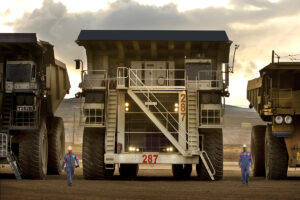Weardale Lithium Limited, a natural resources development company based in County Durham, UK, has announced that it has submitted a planning application to Durham County Council for the phased construction of a lithium extraction plant at Eastgate in Weardale, County Durham.
The facility will be located on the brownfield, former cement works at Eastgate, near Stanhope, for processing geothermal groundwater from existing deep, high specification, production wells nearby.The facility will form part of a plan for regeneration of the old works site, the development of which will be under the highest environmental and safety standards.A local consultation process was carried out ahead of filing the planning application to fully take into consideration the views of local residents and stakeholders. The community engagement was positive with considerable support expressed for the development and regeneration of the site utilising critical minerals processing, which is vital for energy transition.The groundwaters will be transported from well-sites via carefully located pipelines, negating the need for tanker journeys on minor roads, to the pilot plant. This will enable the pilot plant to operate with continuous flow at significant flowrates.Once completed, it will be one of the most advanced lithium extraction plants in Europe. The site is sufficiently large enough for processing to scale-up lithium extraction, and also for other uses such as geothermal energy infrastructure, green technologies and associated business opportunities.Not only can the site potentially act as a regional centre for producing lithium from multiple locations and sources, but also as a hub for business connected with energy transition and sustainability.Initially, it is estimated the development plan will create 20 – 50 on site jobs, plus additional employment within the local construction sector and supply chains.Scaling up to full commercial production, over the next four years, could produce approximately 10 000 t of lithium carbonate per year, creating around 125 jobs and generating an estimated £1 billion of gross economic value for the North East region.The Eastgate site has been dormant for more than 20 years since the closure of the cement works with the estimated loss of more than 120 jobs.Weardale Lithium believes utilising a brownfield, former industrial site in an extensively rural area is a logical proposal and will avoid unnecessary greenfield development in Weardale.The application for the pilot plant follows more than three years of work in the area including trialling of multiple Direct Lithium Extraction (DLE) technologies to find the optimal way to extract lithium from the geothermal groundwaters.Weardale Lithium was the first company to successfully extract lithium from the groundwaters in the North Pennine Orefield.DLE is a low-impact, low-carbon and low-water usage method of extracting lithium and will be done so using renewable energy sources where feasible.For the first 12 months of the site’s operation, a field trials stage project will be conducted, paving the way for the construction of the larger capacity pilot plant.The planning application is accompanied by comprehensive ecological and biodiversity, noise, air quality, highways, landscape, heritage, groundwater, surface water, and flood risk assessments.Stewart Dickson, CEO of Weardale Lithium, said:“This application for a pilot processing plant adjacent to existing wells is the next significant step towards establishing a facility for domestic lithium production from naturally occurring geothermal groundwaters in the North East.The development, if approved, will represent a multi-million pound investment in Weardale and generate highly skilled jobs vital to the energy transition. This transition requires a significant amount of critical minerals such as lithium. By developing this project, the UK can move towards secure, domestic and fully traceable supply.We have long signalled our intent to re-develop the site at Eastgate and breathe new life into the derelict former industrial site, which, if our application is successful, will become a focal point for the UK lithium industry together with green energies and technologies co-located. We have been pleased to receive very positive responses from the local communities and parish councils during our consultation phases and look forward to working together to make this future facing project a reality.”
Read the article online at:
This article was published by:
Visit the original article here



